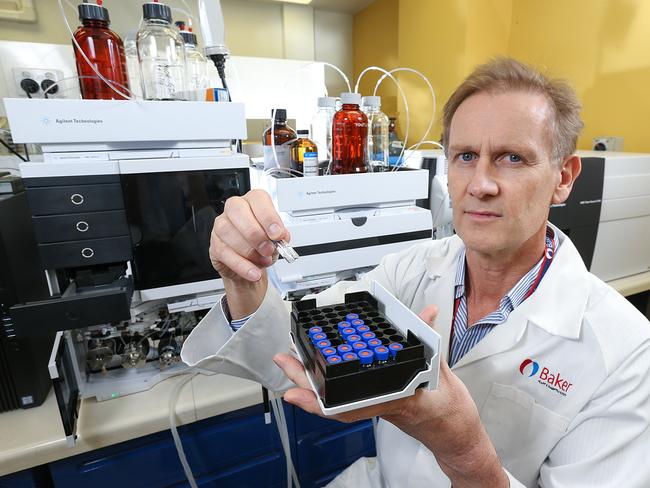Baker Institute develops blood test for recurrent cardiovascular disease
MELBOURNE researchers have developed a blood test that can detect whether someone is at risk of a secondary heart attack.
VIC News
Don't miss out on the headlines from VIC News. Followed categories will be added to My News.
MELBOURNE researchers have developed a blood test that can detect whether someone is at risk of a secondary heart attack.
And researchers at the Baker Institute are now seeking funding to develop this same blood test into a way of detecting the risk of an initial heart attack in healthy adults, as well as screening for diabetes and Alzheimer’s disease risk as part of a routine GP check.
About 430,000 Australians have had a heart attack, with a third at risk of a repeat attack.
DRUG PROMISES TO OVERCOME DVT DANGER
CHRONIC PHYSICAL ILLNESSES CAN AFFECT MENTAL HEALTH: REPORT
HOW ELWOOD WOMAN SURVIVES RARE SILENT HEART DEFECT
Lead researcher Professor Peter Meikle, head of metabolomics at the Baker, said it was important to know what patients were at immediate risk of a recurrent heart attack to offer aggressive prevention treatment to the right patients.
Statistics from the Heart Foundation show one in five men and 14 per cent of women die from their second heart attack.

“The first heart attack is typically telling us that this person has disease right through their heart, and there are other plaques that may also rupture,” Prof Meikle said. “That group as a whole is at increased risk, but not all of them will have a recurrent event.”
The team tested more than 340 lipids in the blood of almost 10,000 patients, finding seven blood fats that accurately predict a subsequent cardiovascular event within five years.
“We already know that cholesterol is a risk factor for heart disease, and so is age, BMI and your history of disease — we wanted to identify lipids that can improve our existing risk factors,” Prof Meikle said.
The findings are published in the journal, JCI Insight.
A prototype of this test made with the same biotech company the Melbourne researchers are working with, but which only uses two lipid markers, is already in use at the Mayo Clinic in the US.
Prof Meikle said their more comprehensive version of the test was expected to be clinically available in two years, and was the forerunner in a larger disease-prevention program.
His team is now applying for funding to start a large trial to assess how accurately the test could predict diseases such as type 2 diabetes, heart disease and Alzheimer’s disease.
“All of these diseases are associated with dysregulation of our metabolism, and using lipids we have identified markers can predict Alzheimer’s and diabetes,” Prof Meikle said.
Heart Foundation health director Rachelle Foreman said while the new test would be a useful tool in the prevention armoury, lifestyle changes and preventive measures significantly reduced the risk of repeat heart attacks.


